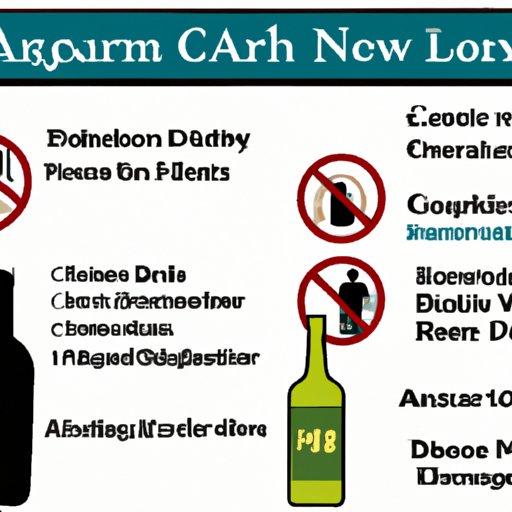
Introduction
Are you new to North Carolina or a seasoned resident looking to brush up on the state’s alcohol laws? Whether you’re visiting family or out on a night on the town, it’s important to know when and where you can legally purchase alcohol in NC. In this article, we’ll explore North Carolina’s alcohol laws, including key regulations, purchasing dos and don’ts, and a guide to after-hours alcohol purchases.
Demystifying North Carolina’s Alcohol Laws: When Can You Buy Alcohol in NC?
When it comes to purchasing alcohol in North Carolina, there are a few important regulations to remember. First and foremost, anyone purchasing or consuming alcohol in the state must be at least 21 years of age. Additionally, North Carolina is what is known as a ‘control state,’ meaning that the state government controls the sale of liquor in the state.
When it comes to the hours of sale for alcohol, North Carolina laws stipulate that alcohol sales are only permitted between the hours of 7am and 2am Monday through Saturday, and 12pm to 2am on Sundays.
It’s worth noting that some counties in North Carolina have additional restrictions on alcohol sales, such as shortened hours or dry counties where the sale of alcohol is not permitted at all.
The Dos and Don’ts of Alcohol Purchasing in NC
Here are some important tips to keep in mind when purchasing alcohol in North Carolina:
- Do have proper identification: As previously stated, you must be at least 21 years of age to purchase alcohol in NC. Additionally, you must have a valid driver’s license or government-issued ID on hand to prove your age when purchasing alcohol.
- Do purchase alcohol during legal hours: North Carolina laws stipulate that alcohol sales are only permitted between certain hours, so it’s important to plan your purchases accordingly.
- Don’t purchase alcohol from unlicensed vendors: In North Carolina, it’s illegal to purchase alcohol from anyone who isn’t a licensed vendor. Be wary of individuals attempting to sell alcohol outside of a licensed establishment.
- Don’t purchase alcohol for minors: It’s illegal to purchase or provide alcohol to anyone under the age of 21 in North Carolina. Additionally, if you’re caught purchasing alcohol for someone who is underage, you could face serious legal consequences.
The History of North Carolina’s Alcohol Laws
Like many states, North Carolina’s alcohol laws have undergone significant changes over time. Historically, the state has had a deeply ingrained prohibitionist culture, with many counties electing to remain dry through the early 20th century.
In 1937, the state established the ABC (Alcoholic Beverage Control) Commission, which is responsible for regulating and overseeing the sale of liquor in the state. Since then, several important changes have been made to NC’s alcohol laws, including the legalization of beer and wine sales in grocery stores in the 1970s, and an overhaul of state law in 2008 that allowed for the sale of beer and wine in restaurants on Sundays.
Nightlife in NC: A Guide to Buying Alcohol After Hours
While North Carolina’s alcohol sale hours may seem restrictive, there are some options for purchasing alcohol outside of regular business hours. Specifically, North Carolina law allows for the sale of alcohol until 2:30am at certain establishments, including bars and restaurants. Additionally, some hotels and other lodging accommodations may have ABC permits that allow them to sell alcohol 24 hours a day.
If you’re planning on purchasing alcohol after hours, it’s important to keep in mind that these sales are still subject to state regulations surrounding proper identification, age restrictions, and other licensing requirements.
North Carolina vs. its Neighbors: A Comparison of Alcohol Laws
For those living in border towns or frequenting neighboring states, it’s useful to know how North Carolina’s alcohol laws compare to those of its neighbors.
Virginia and Tennessee, two states that share borders with North Carolina, are also control states with state-run liquor stores. However, both Virginia and Tennessee have more lenient hours of sale when compared to North Carolina, with some locations selling liquor until 3am or later.
South Carolina, on the other hand, permits private businesses to sell beer, wine, and liquor, but does not permit the sale of alcohol in grocery stores or gas stations.
NC’s Strange Alcohol Laws: A Look at the Unusual Restrictions Across the State
While North Carolina’s alcohol laws may seem fairly straightforward, there are some unusual restrictions on alcohol sales and consumption across the state. For example, it’s illegal to purchase more than one alcoholic beverage at a time in some counties, and certain municipalities enforce ‘last call’ for alcohol before the legal 2am cutoff.
One of the most unusual laws in the state pertains to the sale of beer in growlers – refillable containers used for transporting beer from the brewery to the consumer. In North Carolina, it’s legal for breweries to sell beer in 64-ounce growlers, but not in 32- or 128-ounce containers. This strange restriction has been a point of controversy for many in the craft beer community.
Drinking in North Carolina: A Guide for Visitors
If you’re visiting North Carolina and plan to purchase or consume alcohol while in the state, there are a few important things to keep in mind. First, be sure to carry a valid ID with you at all times if you plan to purchase alcohol. Additionally, be aware of North Carolina’s hours of sale, which do not permit alcohol sales after 2am. Finally, if you plan to explore the state’s nightlife scene, be sure to research local laws and regulations specific to the areas you’ll be visiting.
Conclusion
Navigating North Carolina’s alcohol laws doesn’t have to be difficult or confusing. By keeping key regulations and licensing requirements in mind, and planning purchases accordingly, you can enjoy North Carolina’s thriving craft beer, wine, and spirits scene without running afoul of the law.
Whether you’re a resident or a visitor, understanding North Carolina’s alcohol laws is an important part of enjoying the state’s unique culture and nightlife.




